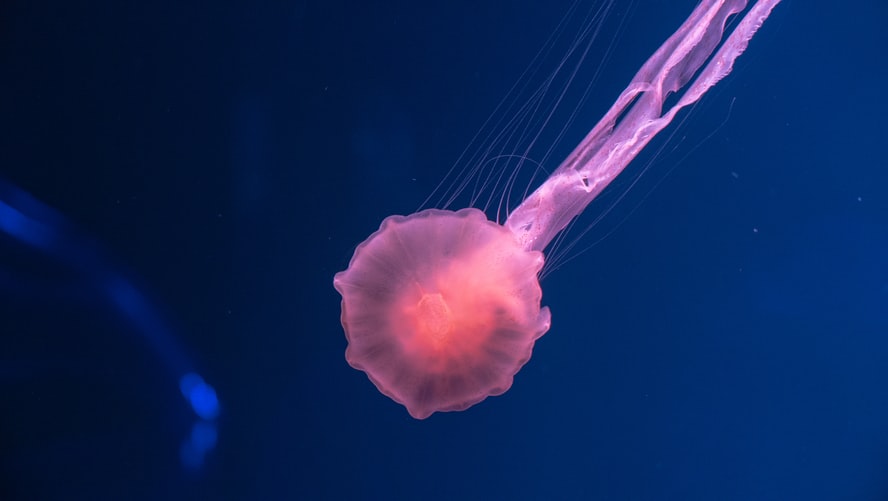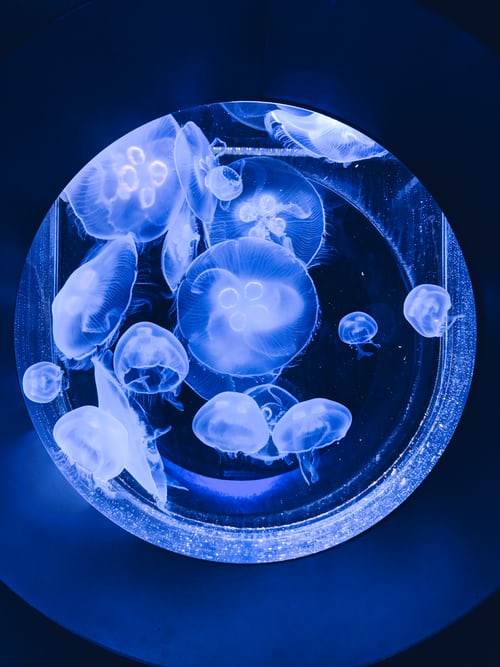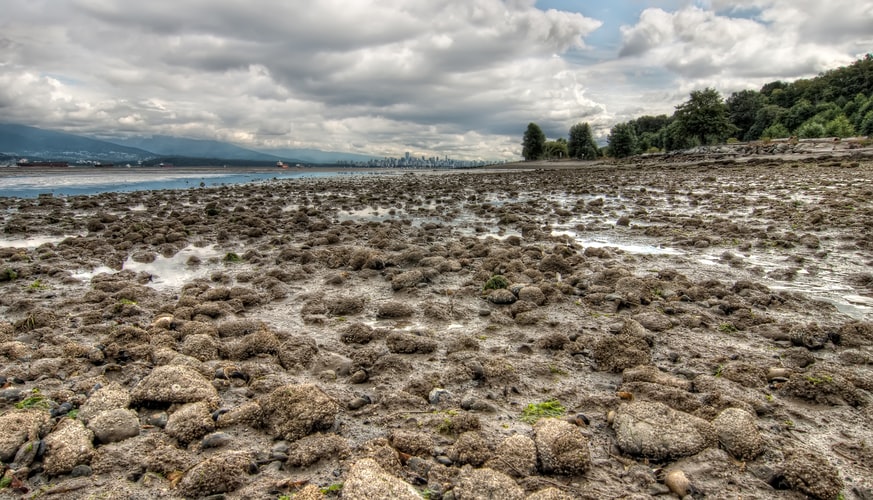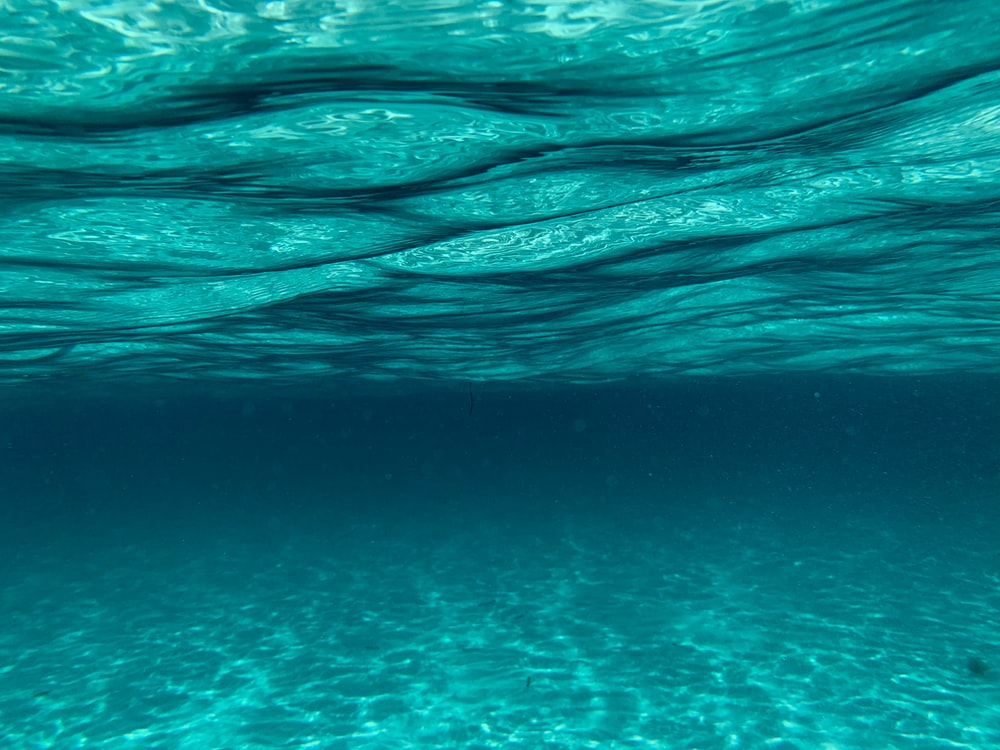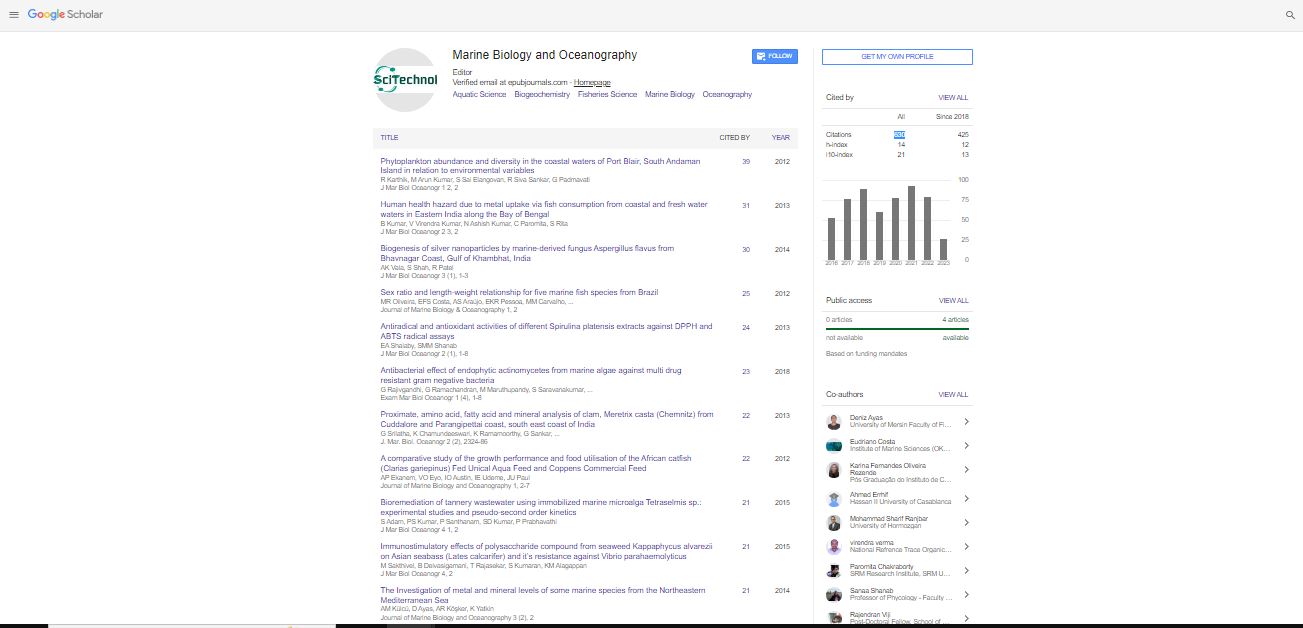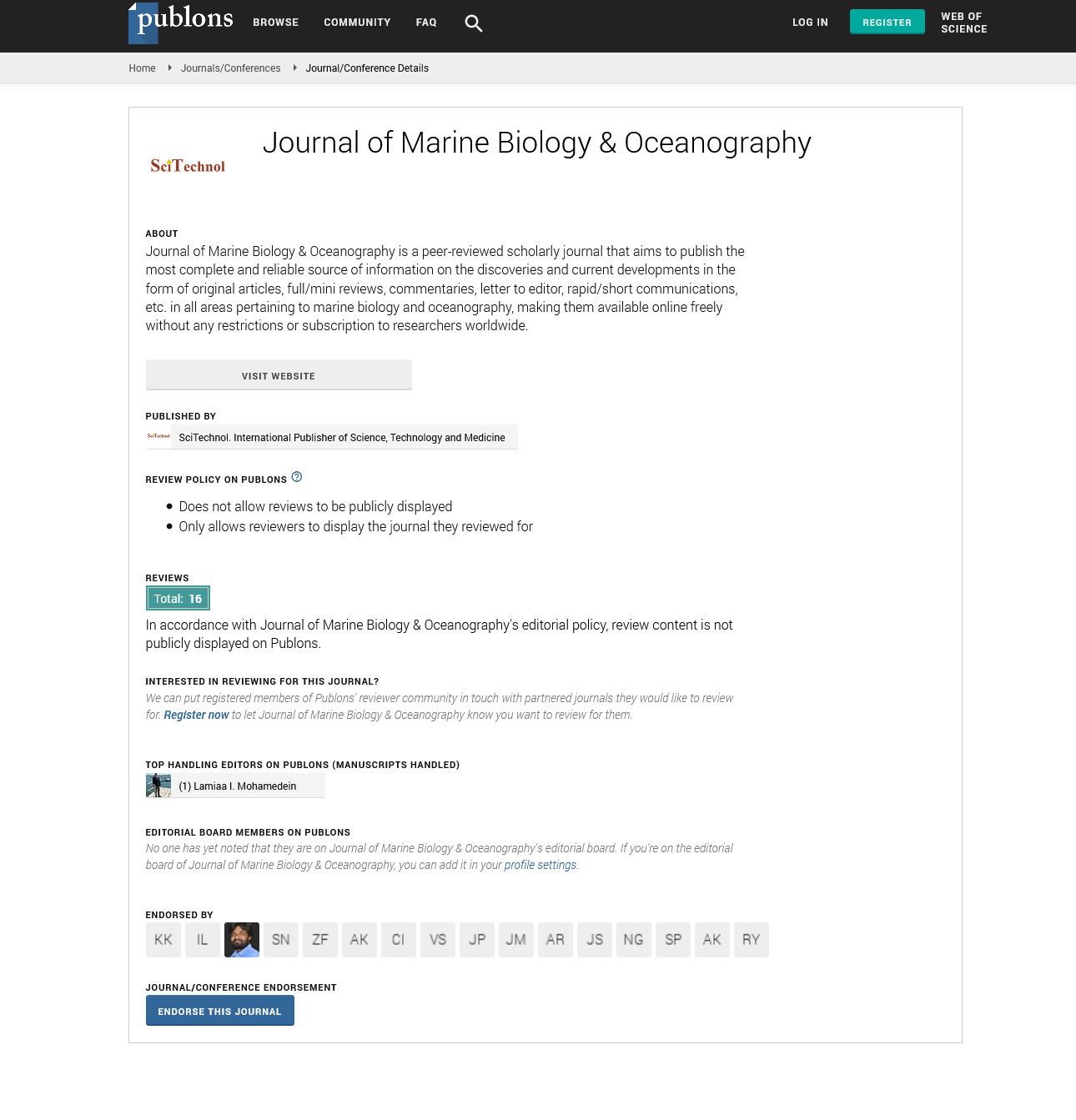About the Journal of Marine Biology & Oceanography

Journal of Marine Biology & Oceanography is a peer-reviewed scholarly journal that aims to publish the most complete and reliable source of information on the discoveries and current developments in the form of original articles, full/mini reviews, commentaries, letter to editor, rapid/short communications, etc. in all areas pertaining to marine biology and oceanography, making them available online freely without any restrictions or subscription to researchers worldwide.
Journal of Marine Biology & Oceanography publishes results of research on marine biology, biological/physical/chemical/ geological oceanography, and other relevantly related areas.
The Journal is using Editorial Manager System for maintaining quality review process. Editorial Manager is an online manuscript submission, review and tracking system. Review process is performed by the editorial board members of Journal of Marine Biology & Oceanography or outside experts; the validation by at least two independent reviewers followed by the editor’s approval is required for the acceptance of any citable manuscript for publication in the Journal. Authors may submit manuscripts and track its progress through the system, hopefully to publication. Reviewers can download manuscripts and submit their opinions to the editor in the Editorial Manager System. Editors can manage the entire submission/review/revision/publication process.
Submit your manuscript at Online Submission System
Manuscripts can also be submitted through E-mail as an attachment to the Editorial Office at publisher@scitechnol.com
*2016 Journal Impact Factor is the ratio of the number of citations achieved in the year 2016 based on Google Search and Google Scholar Citations to the total number of articles published in the last two years i.e. in 2014 and 2015. Impact factor measures the quality of the Journal. If ‘X’ is the total number of articles published in 2014 and 2015, and ‘Y’ is the number of times these articles were cited in indexed journals during 2016 then, impact factor = Y/X.
Climatology
Climatology is not only concerned with the analysis of climate patterns and statistics (e.g. temperature, precipitation, atmospheric moisture) but also with seasonal to inter-annual climate variability, long-term changes in mean and variability characteristics, climate extremes and seasonality.
Paleoceanography is the study of the history of the oceans. It encompasses aspects of oceanography, climatology, biology, chemistry and geology. Paleoceanographic studies using environment models and different proxies enable the scientific community to assess the role of the oceanic processes in the global climate by the re-construction of past climate at various intervals. The main sources of information are biogenic and inorganic marine sediments, as well as corals. Biogenic sediment includes planktonic and benthic fossils whereas inorganic sediment includes ice-rafted debris and dust.
Hydrobiology
Hydrobiology is an ecological science which deals with the study of water populations their interrelations with habitat and significance for the transformation of energy and matter, and the biological productivity of the ocean, seas, and inland waters.
Coastal geography
Coastal geography is the study of interface between the ocean and the land, which incorporates both the physical geography and the human geography of the coast.
Limnology
Limnology is the study of the structural and functional interrelationships of organisms of inland waters-lakes (both freshwater and saline), reservoirs, rivers, streams, wetlands, and groundwater as their dynamic physical, chemical, and biotic environments affect them.
Marine Drugs
The drugs obtained from marine organisms which are being conventionally used like Shark & Cod liver oil, Sodium alginate, Agar-agar, Chitin etc.
Marine organisms are potential source for drug discovery. Life has originated from oceans and contains highly ecological, chemical & biological diversity starting from micro organisms to vertebrates. This diversity has been the source of unique chemical compounds which hold tremendous pharmaceutical potential.
Ocean
The whole body of salt water which covers the most of the Earth’s surface. The average salinity of ocean water is approximately three percent. Five oceans of the world are Atlantic, Pacific, Indian, Arctic, and Antarctic.
The ocean makes our planet a wonderful place to live. It gives us more than half of the oxygen we breathe. It regulates the climate, absorbs a quarter of the carbon that we put into the atmosphere every year, provides livelihoods for hundreds of millions of people.
Marine Biology
It is the study of ocean plants and animals and their ecological relationships. The study of Marine Biology includes astronomy, physical oceanography, geology, botany, genetics etc.
Marine Organisms
The animals inhabiting the sea are called marine organisms. Marine organisms may be classified as Nektonic, Planktonic, or Benthic. The distribution of marine organisms depends on the chemical and physical properties of seawater, ocean currents & penetration of light.
Marine Habitat
It is a natural environment where the species or a group of species live i.e., marine life. Marine life depends on the salt water that is in the sea. Marine habitats can be divided into coastal and open ocean habitats.
Marine Ecology & Ecosystem
Marine Ecology is the science that deals with the basic structural and functional relationships within and among living populations and their physical and chemical environments in marine ecosystem. An ecosystem is a group of living organisms in conjunction with the non living components of their environment.
Marine Chemistry
Marine Chemistry is the study deals with the chemical composition and chemical processes of the marine water bodies. Major use of marine chemistry is through the pollution regulation and monitoring in marine environmental protection.
Marine Geology
It is the branch of geology which studies the geological structure and development of the part of Earth’s crust that makes up the floors of the seas and oceans. Marine geology uses the methods and findings of geomorphology, geophysics & geochemistry.
Marine Conversation
It involves the protection and restoration of species and mitigating human activities such as overfishing, habitat destruction, pollution, whaling and other issues that affect marine organisms and ecosystems that are living in oceans & seas throughout the world.
Aquatic Science
It is the science deals with the study of aquatic systems including both freshwater systems & marine systems. Aquatic science involves aquatic ecology, limnology, oceanography and marine biology and hydrology.
Fisheries Science
It is the science that deals with the catching, processing, or selling of fish or other aquatic animals.
It is to protect biodiversity and to create sustainable seafood sources because of the world's dependence on fish for protein.There are many areas of study in this field i.e, The ecology of fisheries, Fisheries management, Aquaculture.
Oceanography
Oceanography is the scientific study of oceans, the life that inhabits them and their physical characteristics, including the depth and extent of ocean waters their movement and chemical makeup and the topography and composition of the ocean floors.
Marine Engineering
Marine engineering is the branch of study that deals with the design, development, production and maintenance of the equipments used at sea and on board sea vessels like boats, ships etc.
Ocean Engineering
Ocean Engineering is a branch of technological studies that deals with the design and operations of man-made systems in the ocean and other marine bodies. It is concerned with mechanical, electrical, electronic and computing technology to support oceanography.
Ocean engineering provides an important link between the other oceanographic disciplines such as marine biology, chemical and physical oceanography, and marine geology and geophysics.
Ichthyology
Ichthyology is the branch of biology which deals with the study of fishes with reference to their structure, relations to one another and to other animals, classification, habits, and uses. It is also known as fish science.
Biogeochemistry
It is the science dealing with the relationship between the geochemistry of a given region and its flora and fauna, including the circulation of such elements as carbon and nitrogen between the environment and the cells of living organisms.
Fast Editorial Execution and Review Process (FEE-Review Process):
Journal of Marine Biology & Oceanography is participating in the Fast Editorial Execution and Review Process (FEE-Review Process) with an additional prepayment of $99 apart from the regular article processing fee. Fast Editorial Execution and Review Process is a special service for the article that enables it to get a faster response in the pre-review stage from the handling editor as well as a review from the reviewer. An author can get a faster response of pre-review maximum in 3 days since submission, and a review process by the reviewer maximum in 5 days, followed by revision/publication in 2 days. If the article gets notified for revision by the handling editor, then it will take another 5 days for external review by the previous reviewer or alternative reviewer.
Acceptance of manuscripts is driven entirely by handling editorial team considerations and independent peer-review, ensuring the highest standards are maintained no matter the route to regular peer-reviewed publication or a fast editorial review process. The handling editor and the article contributor are responsible for adhering to scientific standards. The article FEE-Review process of $99 will not be refunded even if the article is rejected or withdrawn for publication.
The corresponding author or institution/organization is responsible for making the manuscript FEE-Review Process payment. The additional FEE-Review Process payment covers the fast review processing and quick editorial decisions, and regular article publication covers the preparation in various formats for online publication, securing full-text inclusion in a number of permanent archives like HTML, XML, and PDF, and feeding to different indexing agencies.
 Spanish
Spanish  Chinese
Chinese  Russian
Russian  German
German  French
French  Japanese
Japanese  Portuguese
Portuguese  Hindi
Hindi 
